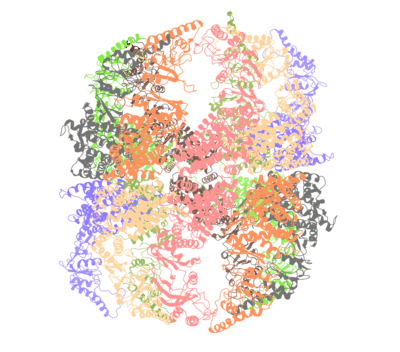TRiC (complex)
T-complex protein Ring Complex (TRiC), otherwise known as Chaperonin Containing TCP-1 (CCT), is a multiprotein complex and the chaperonin of eukaryotic cells. Like the bacterial GroEL, the TRiC complex aids in the folding of ~10% of the proteome, and actin and tubulin are some of its best known substrates.[2][3] TRiC is an example of a Biological machines that folds substrates within the central cavity of its barrel-like assembly using the energy from ATP hydrolysis.

Subunits
The human TRiC complex is formed by two rings containing 8 similar but non-identical subunits, each with molecular weights of ~60 kDa. The two rings are stacked in an asymmetrical fashion, forming a barrel-like structure with a molecular weight of ~1 MDa.[2][3]
| Subunit | MW (kDa)[A] | Features |
|---|---|---|
| TCP1 | 60 | |
| CCT2 | 57 | |
| CCT3 | 61 | |
| CCT4 | 58 | |
| CCT5 | 60 | |
| CCT6 | 58 | Two copies in human genome, CCT6A and CCT6B. |
| CCT7 | 59 | |
| CCT8 | 60 | |
A Molecular weight of human subunits.
See also
References
- Zang, Yunxiang; Jin, Mingliang; Wang, Huping; Cui, Zhicheng; Kong, Liangliang; Liu, Caixuan; Cong, Yao (2016-10-24). "Staggered ATP binding mechanism of eukaryotic chaperonin TRiC (CCT) revealed through high-resolution cryo-EM". Nature Structural & Molecular Biology. Springer Science and Business Media LLC. 23 (12): 1083–1091. doi:10.1038/nsmb.3309. ISSN 1545-9993. PMID 27775711.
- Balchin, David; Hayer-Hartl, Manajit; Hartl, F. Ulrich (2016-06-30). "In vivo aspects of protein folding and quality control". Science. American Association for the Advancement of Science (AAAS). 353 (6294): aac4354. doi:10.1126/science.aac4354. hdl:11858/00-001M-0000-002B-0856-C. ISSN 0036-8075. PMID 27365453.
- Gestaut, Daniel; Limatola, Antonio; Joachimiak, Lukasz; Frydman, Judith (2019). "The ATP-powered gymnastics of TRiC/CCT: an asymmetric protein folding machine with a symmetric origin story". Current Opinion in Structural Biology. Elsevier BV. 55: 50–58. doi:10.1016/j.sbi.2019.03.002. ISSN 0959-440X. PMC 6776438. PMID 30978594.